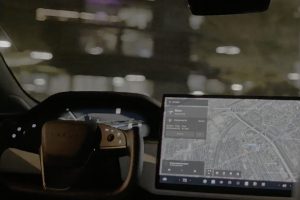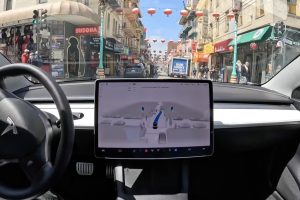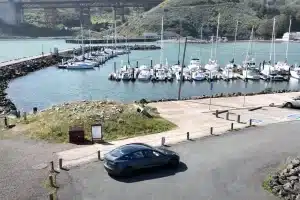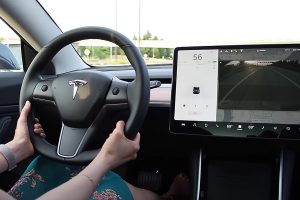- 🔍 The U.S. Justice Department is investigating Tesla over potential securities or wire fraud related to its claims about self-driving capabilities.
- 🚫 Tesla has never claimed its vehicles are capable of full autonomy, allowing drivers to sleep while the car is in motion.
- ⚖️ The probe could result in criminal charges, civil sanctions, or no action at all.
- 📄 Specific statements by Tesla or its executives that may constitute fraud have not been identified yet.
- 🧐 The SEC is also reportedly looking into Tesla’s statements regarding the capabilities of its Full Self-Driving (FSD) suite.
- ⏰ Tesla’s claims about solving FSD have consistently missed timelines, raising concerns about potential misleading statements.
- 🚘 The company plans to unveil a dedicated Robotaxi platform on August 8, adding another layer to the investigations.
In the fast-paced world of autonomous driving technology, Tesla finds itself at the center of a legal maelstrom, facing scrutiny from both the U.S. Justice Department and the Securities and Exchange Commission (SEC). The crux of the matter lies in the company’s claims about its self-driving capabilities, which have allegedly raised concerns about potential securities or wire fraud.
The Probe: Examining Tesla’s Self-Driving Claims
According to reports, the Justice Department is launching a probe to investigate whether Tesla has misled consumers and investors through its statements and assertions regarding its driver-assistance systems, particularly the Full Self-Driving (FSD) suite. The probe aims to determine if Tesla’s claims constitute wire fraud, which involves deception in interstate communications.
It’s important to note that Tesla has never explicitly stated that its vehicles are capable of full autonomy, which would allow drivers to sleep while the car is in motion. However, the Justice Department believes that some of the company’s claims about the FSD suite could potentially constitute securities or wire fraud.
The Regulatory Landscape: SEC’s Watchful Eye
Tesla’s self-driving claims have not only caught the attention of the Justice Department but have also drawn scrutiny from the SEC. Reports indicate that the regulatory body is also examining Tesla’s statements regarding the capabilities of its FSD suite, adding another layer of complexity to the ongoing investigations.
The Burden of Proof: Identifying Specific Statements
While the investigations are in progress, specific statements made by Tesla or its executives that could potentially constitute fraud have yet to be identified. The Justice Department is currently sifting through a vast volume of documents provided by Tesla in response to subpoenas, in an effort to uncover any potentially misleading or fraudulent claims.
The Timing Conundrum: Missed Deadlines and Unfulfilled Promises
One of the key concerns surrounding Tesla’s self-driving claims lies in the consistent discrepancy between the company’s stated timelines and the actual progress made in achieving full autonomy. Year after year, Tesla has claimed that it is on the verge of solving FSD by the end of the year, only to fall short of delivering a fully autonomous driving suite.
This pattern of missed deadlines and unfulfilled promises has fueled concerns about the potential for misleading statements, prompting regulatory scrutiny and raising questions about the veracity of Tesla’s claims.
The Robotaxi Unveiling: Adding Fuel to the Fire
Amidst the ongoing investigations, Tesla’s plans to unveil a dedicated Robotaxi platform on August 8, 2024, have added yet another layer of complexity to the situation. This highly anticipated event promises to showcase the company’s latest advancements in autonomous driving technology and could potentially shed light on the capabilities and limitations of Tesla’s self-driving systems.
However, the timing of this unveiling, coupled with the ongoing probes, has raised eyebrows and heightened the scrutiny surrounding Tesla’s claims and representations.
As the investigations progress, the potential outcomes range from criminal charges and civil sanctions to a complete exoneration, should no evidence of wrongdoing be found. Regardless of the outcome, this legal saga has thrust Tesla’s autonomy ambitions into the spotlight, highlighting the delicate balance between innovation, consumer trust, and regulatory compliance.
In the rapidly evolving landscape of autonomous driving technology, Tesla’s journey serves as a cautionary tale about the importance of transparency, accurate representation, and responsible communication. As the industry continues to push the boundaries of what is possible, it is crucial for companies to navigate the legal and ethical complexities while maintaining a steadfast commitment to consumer safety and trust.
The road ahead for Tesla’s self-driving ambitions is fraught with challenges, but the company’s ability to address these concerns head-on and collaborate with regulatory bodies could ultimately pave the way for a future where autonomous vehicles seamlessly integrate into our lives, ushering in a new era of mobility that prioritizes safety, efficiency, and innovation.





